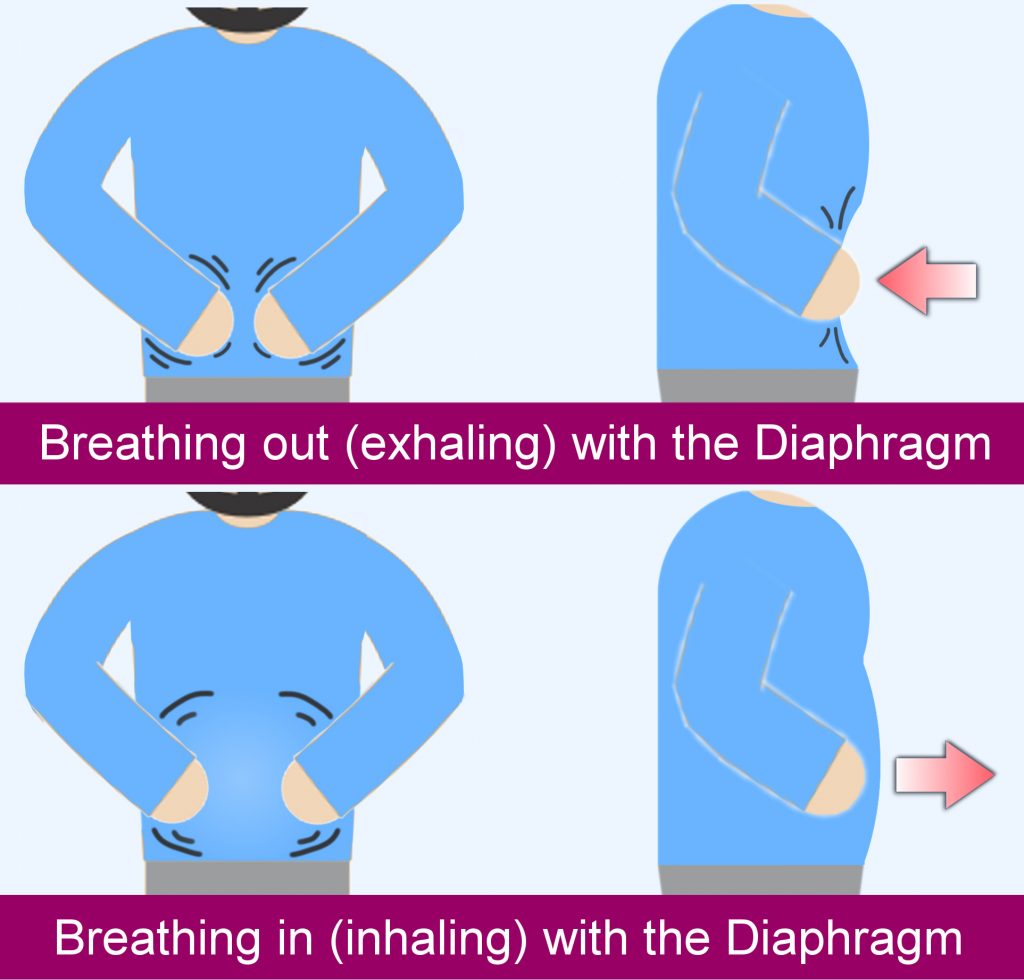
Take a deep breath- a good, deep breath- and let it out. If you’re feeling a little lighter, you do not imagine it. Mental health professionals and yogis alike will recommend deep breathing because of all the unique ways it can benefit your mental health, not just your respiratory system. It’s important to note that breathing exercises are complementary therapy, not an alternative therapy.
When it comes to improving our health, many of us focus on areas we can easily quantify and track, such as how many carbs or calories we consume or how many times we exercise each week. Although it may be harder to measure, reducing and managing stress is a key component of staying healthy. Chronic stress has been linked to heart disease, high blood pressure, diabetes, depression, and anxiety, according to the National Institute of Mental Health.
Types of Breath
You take breaths every moment of the day, but you may not know that there are different types of breathing. In fact, there are four! as given below:

- Eupnea: This is probably the breathing you are doing right now as you are reading this. This is the breathing that occurs when you are not thinking about breathing. Also known as “quiet breathing,” both the diaphragm and external intercostal muscles must contract.
- Diaphragmatic breathing: Also known as deep breathing, the diaphragm muscle must contract in this type of respiration. As the muscle contracts, breath passively leaves the lungs.
- Costal breathing: This type of breathing, also known as “shallow breathing” uses your intercostal muscles, the muscles between your ribs. As these muscles relax, the air leaves your lungs. If you are stressed, you may be doing this breathing right now (or even unconsciously holding your breath).
- Hyperpnea: Also known as forced breathing, both inhalation and exhalation are active, rather than passive, due to muscle contractions.
How Stress Can Impact Disease
According to a previous study, an estimated 60 to 80 per cent of primary care doctor visits are related to stress, and yet only 3 per cent of patients receive stress management help.
Stress affects most health conditions. Basically, our nervous system flows to every tissue in the body. If the stress side of our nervous system is overactive, it literally affects every tissue in our body; any disorder that is already going on in that organ system can be made worse by stress,” he says.
Deep Breathing Signal Your Body To Relax
When you’re under stress, your sympathetic nervous system is stimulated, which is associated with stress-related symptoms such as faster breathing, heart-rate elevation, irritability, elevated blood pressure, anxiety and body tension. That’s part of what is known as the fight or flight response. Slowing down and engaging in deep breathing basically counters the sympathetic nervous system.
When you engage in deep breathing, your abdomen is soft as you engage your diaphragm and take a deep breath in with the intention of really filling up the whole lung with air. You’re slowing down the heart rate, reducing your blood pressure, and relaxing your muscles. When you take that deep breath in, it’s triggering the vagus nervous system in the body. The vagus nerve runs from the brain stem to the abdomen and is the main component of the parasympathetic nervous system, which is responsible for the body’s “rest and digest” activities. Triggering your parasympathetic nervous system helps you start to calm down. You feel better, and your ability to think rationally returns.
As with exercise or meditation, deep breathing will be most beneficial if you treat it as a daily practice. It can help at the moment. However, you will have the most benefit if you practice regularly. This will help your body will recognize what you are doing and be more responsive.
Benefits of Deep Breathing
1. Lower Blood Pressure
People experiencing anxiety can lower their blood pressure by 30 points or more by doing some deep breathing. But if you talk with them about something anxiety-provoking, their blood pressure is going to right back up again.
To get lasting health benefits, including those for blood pressure, consistency and regular practice are key. A review published in July 2019 in Complementary Therapy Medicine analyzed 17 studies involving 1,165 participants and found that slow breathing exercises led to small reductions in blood pressure. The authors concluded that breathing exercises may be a reasonable first treatment for people with prehypertension or low-risk high blood pressure, especially those who were reluctant to take medication.
2. Asthma and COPD
Breathing exercises are a nonpharmaceutical way to help people with lung conditions such as asthma and COPD manage some aspects of their disease. In people with mild to moderate asthma, breathing exercises can help with hyperventilation symptoms and lung function.
There currently isn’t much evidence that breathing exercises improve asthma symptoms. Diaphragmic breathing- slower, deeper breathing that engages the diaphragm- is often taught in COPD pulmonary rehabilitation programs to help make lungs more efficient and improve oxygen levels, notes the American Lung Association.
Breathing and quality of life can be improved in people with COPD who practice diaphragmic breathing, especially when used in conjunction with other interventions, such as pursed-lip breathing and exercise, according to a systematic review and meta-analysis published in August 2019 in the Annals of Rehabilitation Medicine.
Although the practice of breathing more deeply and intentionally seems simple enough, the American Lung Association cautions that the exercises may take time to perfect. Start slowly, and don’t first try deep breathing when you are feeling breathless, the group suggests.
3. Depression and Anxiety
Chronic stress is a common problem that has become even more prevalent since the COVID-19 pandemic began. That stress can lead to a disruption of normal breathing rhythm, and in turn, contribute to anxiety and other mental health conditions.
By doing mindful breathing exercises, they can start to rebalance their breath system, which can lead to improvements in the way a person feels and thinks. The more stressed we become, the harder it can be for us to think clearly. In one small study published in June 2017 in Frontiers in Psychology, participants attended 20 sessions teaching belly breath (another term for diaphragmatic breathing) over eight weeks, which resulted in significantly lower levels of the stress hormone cortisol and significantly higher sustained attention rates than the control group. Overexposure to cortisol (and other stress hormones) is linked to an increased risk of a variety of health issues, including depression and anxiety.
4. Reduce Tension & Headaches
Calming the sympathetic response via deep breathing can also help you relax and reduce muscle tension. This may help with a condition such as a headache in a few ways. It will reduce the tension in your neck and shoulders, which could improve headache pain. If you’re more relaxed, you’ll be able to rest better, which will also help you feel better. Although deep breathing probably won’t help in the middle of a headache, practising regularly or the moment you feel a headache coming on may be useful, especially when combined with preventative and acute medication.
5. Irritable Bowel Syndrome (IBS)
There can be digestive benefits of deep breathing. The physiological movements of the diaphragm can help relieve tension in the digestive tract and can help with GERD (gastroesophageal reflux disease) symptoms, constipation, diarrhoea, and urgency.
Deep breath may help with these symptoms because tension can interfere with good digestion. A small study published in April 2020 in Frontiers in Psychiatry in adults with IBS that included training in progressive muscle relaxation and diaphragmatic breathing found that compared to wait-list control, the intervention led to improvements in IBS symptoms, depression, and quality of life.
6. Reduce Severity of Hot Flashes
High levels of cortisol, one of the fight or flight stress-related hormones, have been linked to hot flashes, a menopause symptom, according to a study published in April 2017 in Maturitas. There is some evidence that paced breathing- deep, slow breathing at a rate of 6 to 8 breaths per minute- may help reduce hot flashes.
7. Better Sleep
A good night’s sleep is just as important as regular exercise and a healthy diet. Research shows that poor sleep has immediate negative effects on your hormones, exercise performance, and brain function It can also cause weight gain and increase disease risk in both adults and children.
In contrast, good sleep can help you eat less, exercise better, and be healthier
Deep Breath reduces the tension and gives the better sleep.
Financial and Business expert having 30+ Years of vast experience in running successful businesses and managing finance.






